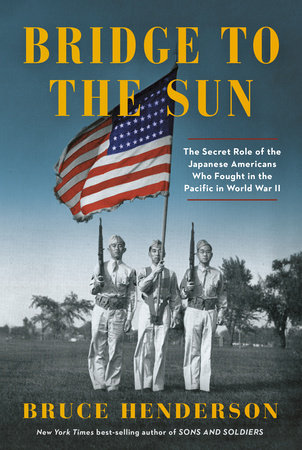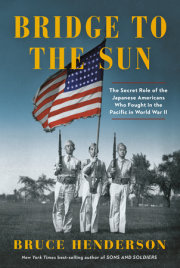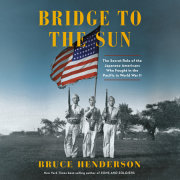Chapter One
The Type of Soldier We Want
Kazuo Komoto was born in the heart of California’s Central Valley. He was the first of six boys. His father, Yoshikazu, had immigrated on his own from Japan at the age of seventeen in 1907. Landing in Seattle, he worked as a railroad and field laborer for ten years before returning to Japan and marrying Hisano Waki from their hometown of Okayama, a city on the western shore of Japan’s main island of Honshu, bounded on the south by the Island Sea and known for its traditional gardens and a samurai-era castle. Together, the newlywed couple migrated to America in early 1918, settling in Sanger, California. Kazuo was born nine months later.
It was a hardscrabble life on cracked, sunbaked land made fertile thanks to the miracle of irrigation. Hisano, who had a comfortable upbringing in Japan, cried herself to sleep the first night in her new home. The wind howled through the slats of the shack in the middle of a treeless field, and stars were visible through holes in the roof. This was not the life she had envisioned. As the years passed and her babies came, she grew concerned about what she saw as America’s discriminatory society weighted against Japanese immigrants and their children, fearing that it would be difficult for her sons to get ahead in life. She had seen many young Nisei men unable to find decent jobs, having to work as farm laborers or in produce stands. In her mind, acquiring an education was paramount. To complement the local public school, she enrolled seven-year-old Kazuo and his school-age brothers in a Japanese school two miles away. She walked them there every Saturday, signaling to her young sons the importance she placed on their education.
By the time Kazuo was ten years old, his father was making a decent living growing grapes and strawberries on twenty acres, much of which he delivered himself to the 7th Street farmers’ market in Los Angeles over the winding road through the Tehachapi Mountains known as the Grapevine. Like other immigrants from Japan, Kazuo’s parents were not allowed to hold U.S. citizenship. And since they were ineligible for citizenship, under California’s restrictive Alien Land Laws of 1913 and 1920, they could not own land or hold long-term leases, which meant Kazuo’s father could farm only rented land. A quiet man who worked long hours, he didn’t have much time or energy for the children, and they were largely reared by their strong-willed mother. It was she who, in 1928, decided to take her oldest son to Japan so he could learn more about his ancestral culture and receive a traditional Japanese education.
Kazuo gave his mother no argument when she left him in the care of his paternal grandparents in Okayama and returned to California. His grandfather, a Shinto priest, made an immediate impact on young Kazuo, although the boy was influenced more by his elder’s conduct than his words. The old man lived, to the end, a disciplined life, yet was always kind to others. Kazuo tried his best to follow his grandfather’s example.
It didn’t take Kazuo long to learn firsthand that Japan had its own immigrant discrimination. Anyone of Japanese ancestry coming from America (and elsewhere) was considered lower class by native-born Japanese. Being the only American in school targeted him for teasing and bullying. He looked like them, but the other kids did not accept him as one of their own. In America, he was Japanese; in Japan, he was American. But the personable boy dismissed the insults and began to make friends.
After two years in elementary school, Kazuo entered intermediate school. He read voraciously, anything he could find, which helped him with basic Japanese grammar as well as memorizing some two thousand commonly used ideographs known as kanji—characters adopted from Chinese that are used in the Japanese writing system—which the students were expected to know by the sixth grade. Thanks to his extracurricular reading, his vocabulary expanded greatly. After graduating from sixth grade, he took the admission test for preparatory high school. Of the more than one thousand students in the region taking the exam, 250 passed. Kazuo was one of them. Already thinking about what he would study after high school at university, he seemed on track to get the education his mother wanted for him. By then, both grandparents had passed away, and Kazuo was living with his mother’s sister.
During his decade in Japan (1928–38), Kazuo witnessed the country moving steadily toward militarism. Japan’s national policy to spread influence politically and militarily led to the 1931 invasion of Manchuria, which was colonized and used as a base from which to attack China in 1937. In this rising tide of imperialism, the legions of the soldiers going off to “protect Japan” were revered as saviors. But protect and save Japan from what? Kazuo often wondered. It seemed that Japan was always the aggressor. But this was not an opinion he could freely express. On occasion, in fact, he had to stand compliantly with other students cheering trains filled with soldiers yelling the slogan first used centuries ago to express respect for the emperor but which was now a battle cry.
“Banzai! Banzai! Banzai!”
Playing with friends one day in a park, Kazuo watched a platoon of Japanese army reservists drilling, then breaking for lunch. When three of the soldiers returned a few minutes late, their sergeant beat them, one by one, first with his fists, then kicked them after they fell to the ground. The soldiers took the beatings without a whimper, as the other soldiers and their officer watched. Although only twelve at the time, Kazuo wanted to yell at the sergeant to stop. Why are you beating your own soldiers?
As he grew older, Kazuo worried that if he stayed in Japan he would be drafted and sent off to some faraway war. His high school years passed quickly; he was a good student, popular with his peers, and a star on the track team, setting school records in the hundred yard dash. After his graduation in June 1938, he wrote his mother saying he wanted to come back to the U.S. for college. Although he had enjoyed his time in Japan, he had strong feelings that he did not belong, and did not see himself spending the rest of his life here. He disliked how the people were conditioned to think and act the way the government wanted them to. Here, it was about conforming, and being docile. When a teacher made a statement, that was it, right or wrong, with no discussion. The students didn’t dare ask questions that might embarrass the teacher. As early as first grade, children were taught in shushin (ethics) courses about virtues such as fidelity, diligence, and frugality, and also to obey the emperor and be willing to die for him. Life itself was but a feather, they were told, compared to their obligation to the emperor. But through all the indoctrination, Kazuo never forgot he was an American, and he never accepted all the fuss about what he later derided as “emperor love.”
But there was more to Kazuo’s desire to leave Japan. He had brothers he had not seen in ten years; the youngest ones he hardly knew. He missed his intelligent and supportive mother, and even his father, although he was at times harsh. Kazuo was crestfallen when his mother wrote to him to stay in Japan for college. But his mind was made up. When it was apparent she wasn’t going to send the money for his return, he borrowed enough from his sympathetic aunt for a steamship ticket to California. He didn’t tell anyone at home he was coming, but waited to telephone them when his ship docked in San Francisco. Within a few days of arriving back in Sanger, he told his parents of his plan to enroll in college and become an American diplomat—maybe even one day the U.S. ambassador to Japan, a lofty notion first put in his head years before by his dear grandmother in Okayama.
His father had other ideas. Enough school! As the eldest son, you must work on the farm and work for the family.
Kazuo now understood why his mother had wanted him to stay in Japan for college; she must have known of his father’s plans to put him to work. She protested now, but to no avail. Kazuo felt guilty about being away so long and not helping the family. He was nineteen, and he had never earned a penny, while his brothers had been working on the farm and had part-time jobs in town. Kazuo agreed to put his dream on hold.
He worked hard on the farm, and enjoyed making new friends. His chiseled good looks, quiet sense of humor, and winning smile made him popular with the girls, Japanese as well as Caucasian. But he soon discovered that when he went on a Friday night date in town he could not expect to receive table service anywhere other than the Chop Suey House.
Two years after returning home, he received his draft notice from the Selective Service, and was inducted into the peacetime U.S. Army in March 1941. He was sent to Camp Roberts near San Luis Obispo for ninety days of basic training. One sweltering June day, after finishing a grueling run in the back hills with a full pack, he was ordered to clean up, change his uniform, and report to an administrative office on the double.
Waiting for him was a tall, square-jawed Army officer named Kai Rasmussen, who was touring camps to interview Nisei soldiers as possible candidates for the new Japanese-language school starting up that fall at the San Francisco Presidio. Rasmussen had immigrated to America from Denmark at the age of twenty in 1922, unable to speak a word of English on his arrival. Yet he won admission to West Point two years later, and graduated in the class of 1929. From 1936 to 1940, he served as a military attaché at the U.S. embassy in Tokyo, during which time he learned Japanese, which he spoke with a heavy Scandinavian accent. For six months, he had embedded as an observer with the Imperial Japanese Army in China. Few U.S. military officers knew Japan and its military as well as he did. Now, with tensions rising between the two countries, he had been among a handful of career officers the War Department had charged with organizing the school to train Japanese-speaking soldiers for military intelligence work. That summer, Rasmussen and two other Japanese-speaking officers were visiting camps to interview more than a thousand Nisei soldiers on active duty. Rasmussen had presumed that many young men raised by Japanese immigrants would be fluent in their parents’ language, but he discovered that was not the case. His unofficial survey found that less than 10 percent of Nisei soldiers could read, write, and speak Japanese. The rest had been so thoroughly Americanized in U.S. schools and society that they knew little or no Japanese. Those findings were a shock to Rasmussen as well as the War Department. The statistics would have been even more discouraging were it not for the Kibei—literally, “returned to America”—the name given to those Japanese Americans who came back to the U.S. after receiving some schooling in Japan. Rasmussen estimated that one in ten Nisei had gone to school in Japan. While their years in Japan and retention of the language varied, many of them had returned home to the United States speaking Japanese as well as or better than English. They were a unique generation that was both Japanese and American in language, attitude, and cultural heritage. And Rasmussen recognized early on just how valuable they would be to the U.S. Army in the event of war with Japan.
Kazuo was astonished when the blond, fair-skinned officer launched into passable Japanese. In turn, Rasmussen was impressed with Kazuo’s ten years of education in Japan. He handed Kazuo a Japanese military field manual and asked him to translate some passages, which Kazuo did with the ease of reading the Sunday comics. In truth, after spending the majority of his school years in Japan, Kazuo was now more fluent in Japanese than English. They talked about his time in Japan—some of the same years Rasmussen had been there—and of places they had both been and the natural beauty of the Land of the Rising Sun. They shared stories and memories of the country they both loved. However, in the course of their conversation, it became clear to Rasmussen that Kazuo had fully assimilated back into life in America, and his loyalty to the United States, the country of his birth, was clear and unambiguous.
After explaining the Army’s plans for the new language school, Rasmussen said, “Private Komoto, you are the type of soldier we want. I’d like you to volunteer for the school. You’ll be trained in intelligence work. Should war break out with Japan, we’ll have a special job for you.”
The word volunteer popped out at Kazuo.
“You want volunteers, sir?”
“Yes, the school is voluntary.”
Kazuo didn’t want to volunteer for anything. Truthfully, he was fed up with others telling him what he should be doing with his life.
“Sir, I was drafted for one year of military service. When I get out I want to go to college. I’m sorry, but I’m not interested in volunteering.”
A disappointed Rasmussen said he understood.
Six months later, Pearl Harbor was attacked. When Kazuo, still at Camp Roberts, now assigned to the 48th Infantry Division, heard the terrible news that morning, he thought, It finally happened. He was not shocked by Japan’s aggression like many Americans because of the direction in which he had seen the militarists taking the country, but he hated the thought of fighting his parents’ homeland, where he had left behind many relatives and friends. But he knew he had no choice. First and always, his loyalty was to the country of his birth. The United States of America.
The next day, Kazuo’s platoon boarded a Greyhound bus to Barstow, a railroad town in the California desert. For the next three weeks they protected the switching yards from sabotage. Then, on December 28, his unit was sent to Downey, near Los Angeles, to guard an aircraft manufacturing plant. Kazuo and another Nisei soldier happened to be on duty at the front gate one day when a local newspaper reporter and photographer arrived to tour the plant. A few pictures were taken, and the next day a photo of the two men ran on the front page below the alarming headline:
Jap Soldiers Guarding Aircraft Plant!
Later that day, the company commander called Kazuo and the other soldier into his office. “Boys, I gotta take you off the front gate,” he said. “You’ll guard the back gate from now on.”
Copyright © 2022 by Bruce Henderson. All rights reserved. No part of this excerpt may be reproduced or reprinted without permission in writing from the publisher.






